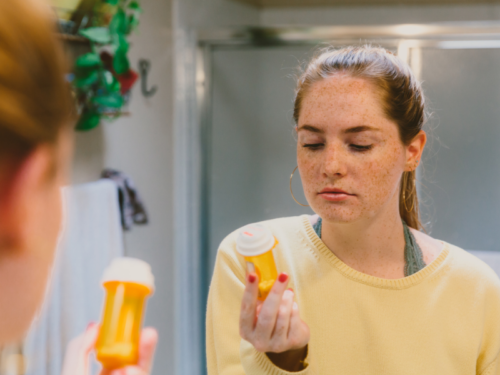
Table of Contents
Lexapro vs Zoloft: Similarities and Differences

Written By: Dr. Eli Muhrer, M.D.
July 12, 2024
7 min.
Thinking about taking Lexapro or Zoloft? Read on to learn the similarities and differences between these two antidepressants.
Learn more about our Clinical Review Process
Table of Contents
If you struggle with a mental health condition, you might be curious about taking a prescription medication to relieve your symptoms. On top of therapy, medications can make a big difference in reducing symptoms and improving your quality of life. Two commonly prescribed antidepressants are Lexapro (the brand name for escitalopram) and Zoloft (the brand name for sertraline). Here’s what you need to know about Lexapro vs Zoloft, including the similarities and differences between the two medications.

Begin virtual therapy and medication management today
Fill out our quick form below to learn if Charlie Health is right for you.
What are the similarities between Zoloft and Lexapro?
As mentioned, both Zoloft and Lexapro are kinds of prescription medication – and there’s a lot of crossover between the two antidepressants. Here’s an overview of their similarities.
They’re both SSRIs
Lexapro (escitalopram) and Zoloft (sertraline) are in the same class of antidepressant medication: selective serotonin reuptake inhibitors (SSRIs). SSRIs are some of the most commonly prescribed antidepressants.
They have the same mechanism of action
Since escitalopram and sertraline are both SSRIs, they have the same mechanism of action, meaning they work the same way. SSRIs target serotonin, a neurotransmitter or chemical messenger, in the brain. Serotonin plays a role in your mood and fear, and low levels of it are thought to be linked to mental health conditions like depression and anxiety.
Lexapro and Zoloft both regulate serotonin and the receptors for serotonin in the brain, says Claire Streeter, PMHNP, ARNP, a Charlie Health Psychiatric Mental Health Nurse Practitioner. Put in simple terms, SSRIs make more serotonin available in the brain between neurons, the messengers of the brain.
They both treat depression and anxiety
Lexapro and Zoloft are often first-line choices for people with mental health conditions like depression or anxiety disorders, Streeter says. Both medications are FDA-approved to treat major depressive disorder, AKA depression. When it comes to anxiety disorders, Lexapro is approved for treating generalized anxiety disorder (GAD), and Zoloft is approved for treating panic disorder (PD) and social anxiety disorder (SAD).
They have similar side effects
Since these antidepressants are from the same drug class, they share a very similar side effect profile.
Shared common side effects of Lexapro and Zoloft include:
- Nausea
- Drowsiness
- Trouble sleeping
- Loss of appetite
- Increased sweating
- Tremors/shakiness
- Increased anxiety
- Sexual side effects/sexual dysfunction (loss of libido, trouble reaching orgasm)
Most of these side effects, like nausea, will be worse when you first start the medication but often subside with time as you adjust to your dose. However, other adverse effects, like sexual dysfunction, might stick around longer. This isn’t a complete list of all adverse effects. You can discuss possible rare and common side effects with your healthcare provider.
They have similar drug interactions
Since Zoloft and Lexapro are in the same drug class (SSRIs), they share many of the same clinically significant drug interactions, meaning interactions between drugs that are significant enough to potentially cause harm or impact the effectiveness of one or more medications. Here are drug interactions to keep in mind for both Zoloft and Lexapro:
- Monoamine oxidase inhibitors (MAOIs)
- Other SSRIs
- SNRIs
- Triptans
- Tricyclic antidepressants
- Fentanyl
- Lithium
- Buspirone
- St. John’s Wort
- Nausea medication like Zofran
- Blood thinners (such as NSAIDs, aspirin, warfarin)
- Alcohol
This is not a complete list of every known drug interaction, so make sure to tell your provider about all medications you take, whether they are over-the-counter or prescription. You should also tell them about any supplements you take since these can interact, too. This way, they can ensure that Lexapro or Zoloft is safe for you.
They have the same major risks
Although these risks are rare, they are important to know when starting Lexapro or Zoloft. Two of these main risks are as follows:
Serotonin syndrome
This is when your body has dangerously high levels of the neurotransmitter serotonin. Cases of serotonin syndrome range from mild to severe and life-threatening, according to Mayo Clinic. It’s important to let your doctor know immediately if you are experiencing any of these symptoms.
- Mild signs: Tremor, nervousness, dilated pupils (meaning your pupils look bigger than normal).
- Moderate signs: Muscle twitches or spasms, sweating, eyes moving side-to-side abnormally.
- Severe signs: Confusion, high fever, seizures, passing out.
If your healthcare provider suspects you might have serotonin syndrome, they may have you lower the dose of medication and, depending on the severity, seek emergency care. However, you should never adjust your antidepressant dose without explicit direction from your prescriber.
Suicidality risk
Even though these medications are antidepressants, SSRI antidepressant use can potentially cause or worsen suicidal thoughts or even suicidal behaviors. The risk of this is higher in teens and young adults under 24. While this is a risk, it is overall a very rare one and does not include a higher risk of suicide attempts. If you start noticing new or worse suicidal thoughts, make sure to tell your prescriber right away.
Both can result in discontinuation syndrome
If and when you and your mental healthcare provider decide it’s time for you to come off the medication (either escitalopram or sertraline), you may experience what’s known as discontinuation syndrome, which results in withdrawal symptoms when you’re coming off the medication. Examples of common withdrawal symptoms from selective serotonin reuptake inhibitors are:
- Dizziness
- Irritability
- Headache
- Anxiety
- “Brain zaps” which are small electric shock sensations
Your provider will have you carefully and slowly taper off the medication to lessen the risk of uncomfortable withdrawal symptoms. Usually, a taper takes place over weeks to months, depending on how long you have been on the medication.
What are the differences between Lexapro and Zoloft?
Even though they’re both selective serotonin reuptake inhibitors, there are a few differences to consider, including:
FDA-approvals
GI issues
Dosing structure
- Lexapro: FDA-approved for generalized anxiety disorder and major depressive disorder in adolescents and adults
- Zoloft: FDA-approved for major depressive disorder, panic disorder, PTSD, social anxiety disorder, and premenstrual dysphoric disorder as well as OCD in children, adolescents, and adults
- Lexapro: Less likely to cause stomach-related side effects than Zoloft
- Zoloft: More likely to cause stomach-related side effects than Lexapro
- Lexapro: The starting dose is typically 10 mg, and the maximum dose is 20 mg.
- Zoloft: The starting dose is 25 mg or 50 mg per day, and the max dose is up to 200 mg.
Different FDA-approvals
The FDA has approved these medications for different conditions. Zoloft (sertraline) is approved for more indications than Lexapro (escitalopram).
All of Lexapro’s FDA approvals are:
- Generalized anxiety disorder (in adolescents and adults)
- Major depressive disorder (in adolescents and adults)
All of Zoloft’s FDA approvals are:
- Major depressive disorder
- Panic disorder
- Post-traumatic stress disorder (PTSD)
- Social anxiety disorder
- Premenstrual dysphoric disorder (PMDD)
- Obsessive-compulsive disorder (OCD) (in children, adolescents, and adults)
Zoloft may cause more GI side effects
Although both medications can cause side effects that affect the gastrointestinal tract, Streeter says Zoloft is more likely to cause upset stomach-related side effects than Lexapro. These side effects include:
- Nausea
- Indigestion
- Diarrhea
- Loose stools
So, if someone already has GI symptoms or a condition such as irritable bowel syndrome (IBS), Streeter says it might be safer to go for Lexapro. However, taking Lexapro doesn’t guarantee that you won’t experience GI side effects, and taking Zoloft doesn’t guarantee that you will experience GI side effects. It all depends on the individual, Streeter says.
Dosing structures
Lexapro and Zoloft dosages don’t line up with each other. There is a completely different dosing structure. For example, the starting dose of Lexapro is typically 10 mg, and the maximum dose is 20 mg. The starting dose of Zoloft is 25 mg or 50 mg per day, and the max dose is up to 200 mg.

Is Lexapro or Zoloft more effective?
If you’re wondering, “Is Lexapro or Zoloft better for treating anxiety and depression?” there isn’t a clear-cut answer. Streeter says that when it comes down to it, one medication isn’t objectively stronger or more effective than the other.
“It’s all person dependent. Some people might respond really great to Zoloft and not to Lexapro, or vice versa,” she adds. “You could have two people, same age, same background, same symptoms, and a different medication might work better for each of them.” It may take some trial and error to figure out which antidepressant is most effective for you and your symptoms. Be patient since it can take several weeks for the meds to really kick in.
Other antidepressant options
SSRIs aren’t always the right type of treatment for everyone. If SSRIs aren’t providing you with the relief you need, or if you can’t take SSRIs due to drug interactions, underlying conditions, or side effects, there are other antidepressant options you can consider, including:
- Serotonin and norepinephrine reuptake inhibitors (SNRIs)
- Tricyclic antidepressants (TCAs)
- Monoamine oxidase inhibitors (MAOIs)
- Atypical antidepressants
A mental healthcare provider like a psychiatrist or psychiatric nurse practitioner will help determine which type of antidepressant is best for the treatment of your anxiety or depression symptoms.

Therapy and medication management at Charlie Health
If you or a loved one are struggling with a mental health condition, Charlie Health is here to help. Our virtual Intensive Outpatient Program (IOP) provides more than once-weekly mental health treatment for teens, young adults, and families dealing with serious mental health conditions. Our expert clinicians incorporate evidence-based therapies into individual counseling, family therapy, and group sessions. We also offer medication management to clients as needed for those who could benefit from psychiatric medications on top of therapy. Our prescribers can determine if a selective serotonin reuptake inhibitor like Zoloft or Lexapro could be the right fit for you. With this kind of holistic mental health treatment, recovery is within reach. Fill out the form below or give us a call to start healing today.
References
https://my.clevelandclinic.org/health/articles/22572-serotonin
https://www.accessdata.fda.gov/drugsatfda_docs/label/2017/021323s047lbl.pdf
https://www.accessdata.fda.gov/drugsatfda_docs/label/2016/019839s74s86s87_20990s35s44s45lbl.pdf
https://my.clevelandclinic.org/health/diseases/17687-serotonin-syndrome
https://www.mayoclinic.org/diseases-conditions/serotonin-syndrome/symptoms-causes/syc-20354758




